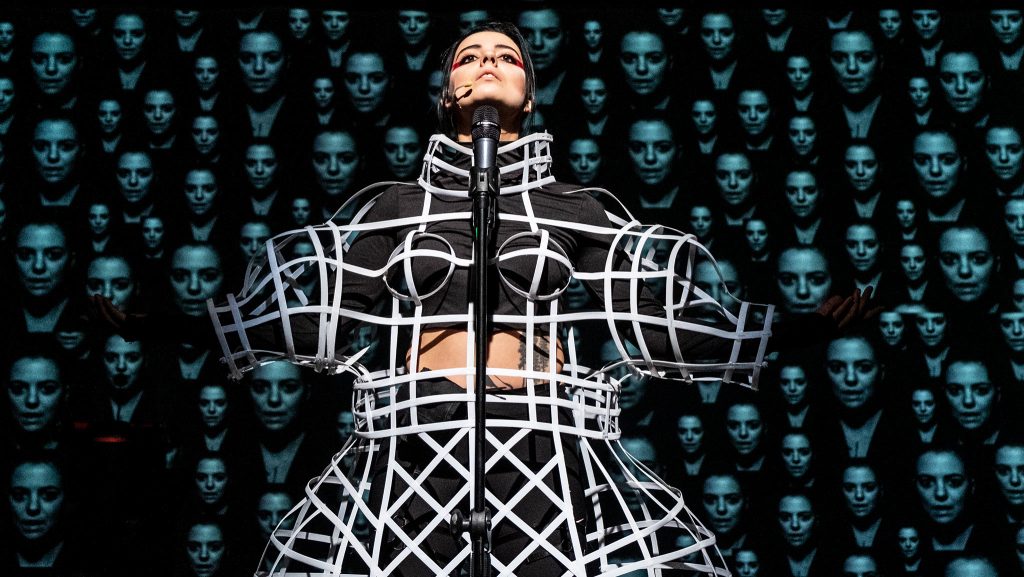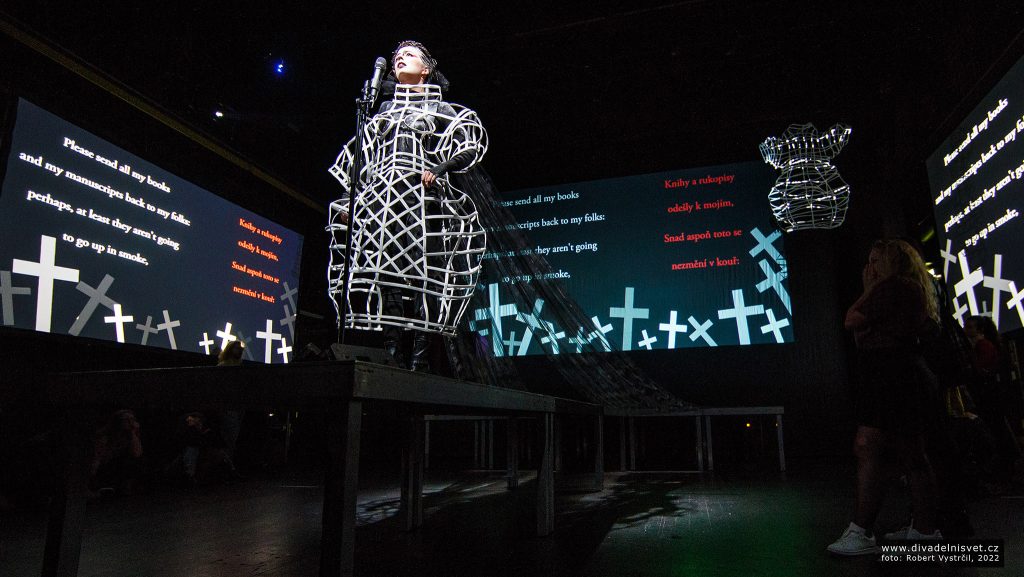Autor: Daria Ancuța
Revista Vestul Dramatic nr. 4 (5) / 2025
Palina Dabravolskaya has, above all, stage presence. Which means that, no matter how hard you try to resist, your eyes are inevitably drawn to her. In the semi-darkness, with a hypnotic, rave-like beat pulsing nonstop, Palina steps onto the catwalk-turned-stage at Mood Factory Pub with disarming ease. There’s something magnetic in her eyes – both fascinating and unsettling. She recites, sings, mixes, and remixes the words of the fairy-tale poem by Belarusian author Maryja Martysievič. Teetering between spoken-word performance and interdisciplinary manifesto, the one-woman show SarmaTY/YA is born, verse by verse, from a sense of urgency. The words pour out dizzyingly, the bass imprints them deep into every fibre, and language barriers gradually melt away, dissolved by the sheer power of an encounter in the realm of the ineffable. Fifty-two explosive minutes, a show perfectly aligned with the curatorial vision of the New Wave International Theatre Festival, organized by the West Theatre Reșița – and a tamer-of-tales creator worth discovering up close.

Daria ANCUȚA: Palina, you brought SarmaTY/YA to the 5th edition of the New Wave International Theatre Festival in Reșița – can you walk us through your decision to apply and join the lineup?
Palina DABRAVOLSKAYA: Our Tour manager Katsiaryna found an application and applied. The most simple story.
Daria ANCUȚA: How did you interpret the festival’s call for „new wave”? What attracted you to its mission?
Palina DABRAVOLSKAYA: Firstly, I’ve never been to Romania before, and that was a pleasure to be invited to this country. Secondly, I think that our performance shows people another way of monodrama, and you can call it a “new wave” in some way.
Daria ANCUȚA: You coined the term “soundrama” for SarmaTY/YA – how would you define it?
Palina DABRAVOLSKAYA: For me it’s always important to name the genre of what I’m doing, for people to understand what they’ll see. Sound + drama = the Musical performance with big part of drama theatre. That’s a performance that uses sound and music as a language.
Daria ANCUȚA: The work blends a wide range of musical influences – rock, folk, hip-hop, rave. How did you select the specific sounds and rhythms? Walk us through your creative process in layering live vocal performance with electronic textures.
Palina DABRAVOLSKAYA: I think that’s just how I feel the music. I love hiphop and I’m deeply connected to my Belarusian roots through songs and traditions. So, while writing music for this performance I somehow needed to add folk songs to it. For example, the melody of a main leitmotif of the performance (the beginning folk song) I heard in my dream. And when I woke up I recorded it.
Daria ANCUȚA: Your piece is based on a poem by Belarusian writer Maryja Martysievič. What drew you to this text?
Palina DABRAVOLSKAYA: When I read it in 2019 i understood that I cannot leave it like that, I need to do something. I loved it so much. It was living in my head for a year, and in 2020 I decided that it will be my first rap-album. So i divided the poem into twelve parts. That’s how I started writing the songs.
Daria ANCUȚA: Performing in Mood Factory Pub is unconventional. How did the space inform your staging and performance? How do you negotiate the line between theatrical storytelling and rave energy in such formats?
Palina DABRAVOLSKAYA: It was hard. But I think we managed to create some theatre space in absolutely not theatrical place. It was an interesting and challenging experience. After it I understood that we could do anything.
Daria ANCUȚA: What freedoms do you prize most in solo performance? Conversely, what constraints challenge you creatively in a one-woman show format?
Palina DABRAVOLSKAYA: In the conditions of emigration, the format of a one-man show is almost the only possible format that you can create. You are left alone with your thoughts, you have no money or sponsors for implementation, and such a performance can be brought to various festivals because, in fact, only you are needed. I am comfortable working in this format because the responsibility lies with me. If something goes wrong, then I understand what my fault is and what is not. Of course, it’s difficult to create everything by myself, but I hope I managed it. Now I work with my partner, and that’s easier than just by yourself.
Daria ANCUȚA: What struck you about the Reșița audience? How did their responsiveness compare to Polish spectators?
Palina DABRAVOLSKAYA: Unfortunately, I played in Poland only one time. So I cannot even compare to Polish audience in that case. But speaking about the Reșița spectators, I was very interested in how the reaction will be. And I was pleased with it. It was a pleasure playing here.
Daria ANCUȚA: What preoccupies you as an artist right now? Any emerging ideas or burning questions? What’s next for you?
Palina DABRAVOLSKAYA: Because I’m an artist in exile, that’s always about work for life. So I’m trying to find possibilities for creative process, but usually that’s not so many chances to do it. So, for now I’m working as a delivery girl in a bakery and writing a new music album.
Palina Dabravolskaja is a Belarusian actress, theatre director, and interdisciplinary artist currently based in Warsaw. In 2017, she graduated from the Belarusian State Academy of Fine Arts with a degree in drama and film acting. After graduating, she worked for five years at the Musical Theatre in Minsk, actively participating in independent projects and staging her own plays.
She has created over eight original theatre projects and performed over 25 roles in Belarus and across Europe. Her directing credits include productions such as „Spine” (presented at the Komuna Theatre in Warsaw, a German/Polish co-production), „Heroines” (Goose on a String Theatre in Brno, Czech Republic), „SARMATY/YA” (presented in Seoul, Munich, Hellerau, Krakow, Lublin, and elsewhere), and others. Palina focuses on exploring themes of identity, exile, memory, and the individual’s place within vast social and cosmic systems. Her work often combines theatre, movement, text, and visual language, and she performs in multiple languages, including Belarusian, Polish, and English.
Music is her passion, which often accompanies her performances. As a musician, Palina Dabravolskaja performs under the pseudonym CHORNABROVA, fusing alternative hip-hop with folklore in a genre she calls b-pop. Her album „COMA” gives voice to a fictional artificial intelligence that reflects on migration, ecology, capitalism, and emotional survival.




